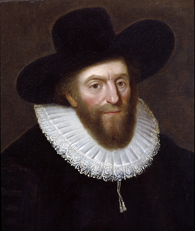Who invented the 'Shakespearean theatre'? That is the question!
Release Date 16 October 2012

The University of Reading is hosting a unique conference on Saturday 24 November which will shed exciting new light on theatre and drama in the age of Shakespeare.
Designed not just for Shakespearean scholars and students, but actors, directors, theatrical and literary audiences, aficionados and the general public, this event promises to put Shakespeare and his contemporaries in their place.
Were Richard Burbage, William Shakespeare and their colleagues, along with their co-investors in the Globe and Blackfriars playhouses, really the leading players in late 16th and early 17th theatre? Or did the theatrical entrepreneur Philip Henslowe and the eminent actor Edward Alleyn have more of a starring role than previously thought?
This event is based on Professor Grace Ioppolo's Henslowe-Alleyn Digitisation Collection, the world's single most important digital archive on early modern English theatre, and will re-write the script when it comes to this important period of theatrical history. It will be the first time that four top Museum of London archaeologists(MOLA), whose work focuses on the era of Shakespeare, will be speaking at a conference together and will examine who really were the most influential figures in late 16th and early 17th century theatre.
Professor Ioppolo, from the University of Reading's Department of English Literature, said: "Shakespeare is assumed by many to be the only important figure in early modern English theatre, but without the men who built the London playhouses and turned theatre performance into a lucrative profession, Shakespeare would never have flourished.
"Far from being the buffoon portrayed by Geoffrey Rush in the film ‘Shakespeare in Love', Philip Henslowe was one of the shrewdest property developers in 16th century London. We should be very grateful that Henslowe and his son-in-law, the eminent actor Edward Alleyn (who originated the roles of Doctor Faustus and Tamburlaine), decided to invest in the theatrical profession."
The archaeologists from MOLA will demonstrate how their work over the last 23 years has transformed so much of what scholars thought they knew about the original venues where the likes of Shakespeare, Burbage and Alleyn trod the boards.
Julian Bowsher pioneered the subject with the excavation of the Rose in 1989 and Pat Miller's study of the Globe brought the ‘Glory of the Banke' to life. Heather Knight excavated both Shoreditch playhouse sites, the Theatre and the Curtain, while Dave Saxby made a particular study of the bear baiting arenas of Bankside which were so popular with 16th and 17th century audiences.
Much of this work has made use of The Henslowe-Alleyn Digitisation Project, which Julian Bowsher has called 'a crucial tool in relating Henslowe's Rose accounts to physical remains.'
The Henslowe-Alleyn Digitisation Project is the largest online collection of material on professional theatre and dramatic performance in the age of Shakespeare. Items include the only surviving records of theatre box office receipts for any play by Shakespeare, and the 1600 contract to build the Fortune Theatre in London, listing the layout and design of the Globe Theatre, where Shakespeare's company performed.
Speakers on the day include three of the world's most eminent Shakespearean scholars: Professors Stanley Wells, R. A. Foakes, and Andrew Gurr, as well as internationally distinguished theatre historians Sally-Beth MacLean, A. H. Nelson and Grace Ioppolo.
Burbage & Shakespeare and/or Henslowe & Alleyn: Who Invented the ‘Shakespearean Theatre'? will take place at the University of Reading on Saturday 24, 10am-5pm.
Tickets (including lunch and reception): £40, with reduced rate of £25 for students, unwaged and over 60s. Online registration with a credit or debit card is now open through the University of Reading (link) store http://www.store.reading.ac.uk/browse/extra_info.asp?compid=2&modid=2&prodid=140&deptid=16&catid=14.
For more information please contact Mrs Jan Cox at j.f.cox@reading.ac.uk, 0118 378 8362
ENDS
For all media enquiries please contact James Barr, University of Reading Press Officer on 0118 378 7115 or by email on j.w.barr@reading.ac.uk
Follow us on Twitter | Like us on Facebook | Read our research blog 'The Forum'
